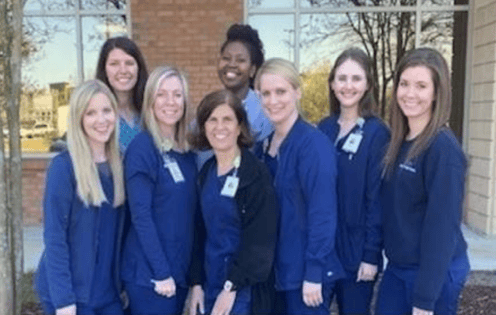Dawn Jeffers, RD, LDN, thought she wanted to be a nurse. But as she started going down that path, she quickly realized it wasn’t for her.
That’s when she found dietetics.
“I loved food, I loved nutrition, and I loved how we could really make a difference in patients’ lives, whether that be through wellness or in the intensive care unit (ICU),” said Dawn, reflecting on her career change.
Dawn has experience with both inpatient and outpatient programs but as a dietitian, she really fell in love with critical care. She relished the challenge and loved learning about how nutrition impacts disease.
 Dawn Jeffers, top left, and the Baton Rouge General clinical nutrition team.
Dawn Jeffers, top left, and the Baton Rouge General clinical nutrition team.
Going from Dietitian to Clinical Nutrition Manager
After focusing her care on kidney, liver, and pancreas transplant patients for a few years, Dawn found herself ready for a clinical nutrition manager role.
“I went into management because I really enjoy improving processes and seeing how I can make the whole department better,” she explained.
She eventually found herself pursuing a job with HHS' hospital food and nutrition services team as the director of clinical nutrition at Baton Rouge General Medical Center and has been in that position for nine years.
Baton Rouge General consists of two campuses with several ICUs, including a burn unit. The main campus also includes oncology, orthopedic, cardiac, and gastrointestinal (GI) surgeries, and more while the second campus has a smaller acute care facility, behavioral health, and a skilled unit.
Dawn oversees a team of 15 dietitians and they work with every unit in the hospital. It’s a huge undertaking.
“My job is to focus on regulatory compliance with the dietitians, so that includes making sure everybody has trained appropriately, we have our licensures and registrations in our file, [and] making sure everybody is documenting appropriately. My goal is to make sure that we’re always on the trend of best practice and that we’re always regulatory compliant,” Dawn shares.
Dawn has also implemented improvements and processes throughout her nine years as director.
One of the first big changes she made was the introduction of a validated nutrition screening tool, which nurses complete upon admission.
Using the results of that screening tool, nurses can consult with dietitians who then assess the patient and make a plan for nutrition interventions.
Accurate documentation is a key component of providing high-quality nutrition care to patients and ensuring hospital leadership can see the value that the clinical nutrition team brings to the hospital.
To support that goal, Dawn trained her team to use the updated electronic medical record (EMR) system, which meant stepping out of her comfort zone into the world of IT.
She also oversaw the incorporation of malnutrition documentation into her team’s work.
“[I was] making sure that everybody was on the same page, we were all documenting appropriately, everybody had the same training, the same education on how we’re identifying and how we’re treating malnutrition for patients. It was a challenge. I have an amazing group of dietitians that were able to learn this very quickly and incorporate it very well,” explained Dawn.
Dealing with COVID-19 as a Clinical Nutrition Manager
COVID-19, of course, brought its own challenges to the team over the last couple of years. “Staffing appropriately to be able to handle the different surges was probably the biggest challenge. As well as dealing with shortages, whether it’s food shortages, product shortages, or tube feeding shortages. You always [had] to have some type of workaround or find some sort of substitute.” recalled Dawn.
But she takes every opportunity to brag on her team and the hard work they do to make sure patients are well cared for, even with all the challenges.
“It’s a great facility, there’s great support. Everybody’s working together just trying to figure out how to get through it. And we do. We have a really good team. A few of them have been dietitians for 15 to 20 years so they’re really good teachers and wonderful at always providing guidance with patient care.”
Aligning Nutrition with the Hospital’s Values
Baton Rouge General has a focus on wellness when it comes to its food offerings for patients and visitors alike. Menus contain low-inflammatory, grain-free items with clean ingredients that support the goal of providing the healthiest food possible to their community.
Dawn weaves in this philosophy with inpatient diets and menus.
Dawn has also had her hand in helping out with a recent malnutrition case study conducted at Baton Rouge General by HHS.
Dawn shared, “[It’s important] that we are all documenting appropriately on our patients. That we are properly identifying these patients as malnourished and identifying the appropriate context of malnutrition as well. We’re really trying to focus on that within every account: improving the documentation not only for the benefit of the patient — identifying malnourished patients sooner, creating an intervention sooner — [but also so] the hospital has proper reimbursement for those patients.”
Looking Ahead
Looking to the future, Dawn has several goals on the horizon for her team.
One of her most immediate objectives is to improve patient satisfaction by tweaking some of their menus.
“I am really excited to dive into that because there are a lot of opportunities that we can look into to improve patient satisfaction. We’re trying to figure out what patients really like,” Dawn shared.
She recently hired a new lead dietitian and looks forward to training her on the many ongoing projects around the hospital and maintaining consistency with malnutrition documentation.
Lastly, the team is working on obtaining their burn verification this September and directing more focus to the burn unit.
Dawn speaks with the excitement of someone who is fresh to the field when talking about the future of her team but she leads with the insight that comes from her depth of experience.

.png?width=450&name=Copy%20of%20Careers%20CTA%20Banners%20(4).png)